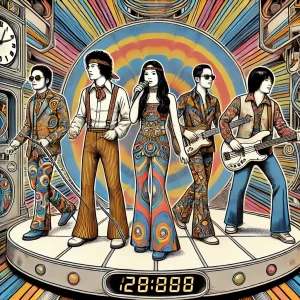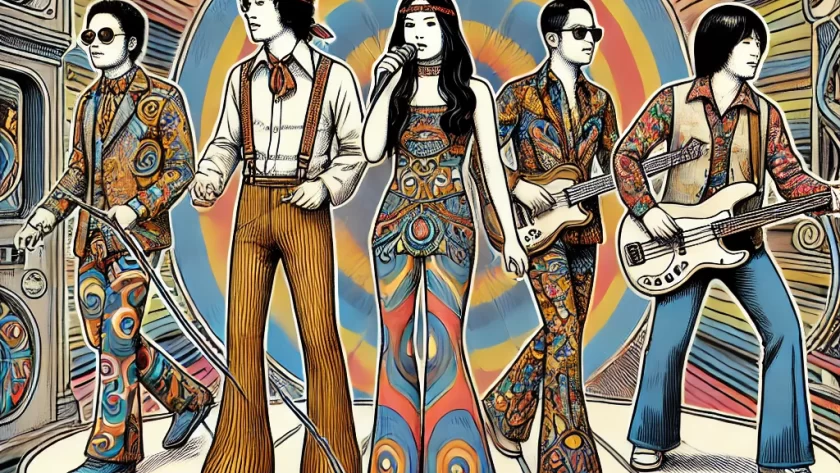タイムマシンにおねがい [Taimu Mashin ni Onegai]
サディスティック・ミカ・バンド [Sadisutikku・Mika・Bando]
Words : 松山猛 [MATSUYAMA Takeshi]
Music : 加藤和彦 [KATO Kazuhiko]
This article introduces the song “Time Machine ni Onegai,” released by Sadistic Mika Band in 1974. The band was formed in 1971, centered around Kazuhiko Kato, formerly of The Folk Crusaders, and his wife, Mika. The band name is a play on the name of the Plastic Ono Band wiki formed by John Lennon. Soon after, Yukihiro Takahashi, who would later become famous with Yellow Magic Orchestra, and guitarist Masayoshi Takanaka, known for his work in jazz fusion, joined the band. Initially, the band didn’t sell well in Japan but received high praise in the UK. The second album, “Kurofune,” which includes “Time Machine ni Onegai,” was produced by Chris Thomas wiki, known for his work with The Beatles and Pink Floyd.
Incidentally, “黒船 / Kurofune” refers to the American Perry fleet’s warships that came to Japan in 1853, demanding the opening of the country during its period of isolation. This term has since been used metaphorically to describe large foreign companies entering the Japanese market, such as Coca-Cola, iPhone, Netflix, etc.
さあ不思議な夢と 遠い昔が好きなら
sā fushigi na yume to tōi mukashi ga suki nara
さあそのスヰッチを 遠い昔に廻わせば
sā sono suiッチ o tōi mukashi ni mawaséba
- さあ [sā] : “Now”, “Here”
- 不思議(ふしぎ) [fushigi] : mysterious
- 夢(ゆめ) [yume] : dream
- 遠い(とおい) [tōi] : distant
- 昔(むかし) [mukashi] : past
- 好き(すき) [suki] : like
- スイッチ(すいっち) [suicchi] : switch
- 回す(まわす) [mawasu] : turn
(translation) “Now, if you like mysterious dreams and distant past,
Well, if you turn that switch to the distant past”
Keep in mind that this is a song about a “Time Machine.” The character “ヰ” is the second character in the “わ” row, which has not been used for over a hundred years. Also, refer to “AIUEO.”
ジュラ期の世界が拡がり
juraki no sekai ga hirogari
そこははるかな化石の時代よ
soko wa haruka na kaseki no jidai yo
アンモナイトはお昼ね
anmonaito wa ohirune
ティラノザウルスお散歩アハハン
tiranozaurusu osanpo ahahan
- ジュラ期 [juraki] : Jurassic
- 世界(せかい) [sekai] : world
- 拡がる(ひろがる) [hirogari] : expand, spread
- 化石(かせき) [kaseki] : fossil
- 時代(じだい) [jidai] : era
- アンモナイト [anmonaito] : ammonite
- 昼寝(ひるね) [hirune] : nap
- ティラノザウルス [tiranozaurusu] : Tyrannosaurus
- 散歩(さんぽ) [sanpo] : walk
(translation) “The world of the Jurassic expands,
It’s the era of distant fossils,
The ammonite takes a nap,
The Tyrannosaurus takes a walk, ahahan”

The Jurassic period lasted from about 201.3 million years ago to around 145.5 million years ago.
“Jidai” can also refer to “Jidai.”
“Sanpo” can also refer to the article “Hey Let’s Go (Sanpo)” from yesterday.
さあ無邪気な夢のはずむすてきな時代へ
sā mujaki na yume no hazumu suteki na jidai e
さあタップダンスと恋とシネマの明け暮れ
sā tappudansu to koi to shinema no akekure
- 無邪気(むじゃき) [mujaki] : innocent
- はずむ [hazumu] : bounce
- 素敵な(すてきな) [suteki na] : wonderful
- タップダンス [tappudansu] : tap dance
- 恋(こい) [koi] : love
- シネマ [shinema] : cinema
- 明け(あけ) [ake] : dawn
- 暮れ(くれ) [kure] : dusk
(translation) “Now, to a wonderful era of innocent dreams,
Well, tap dancing, love, and cinema day and night”
きらめく黄金時代はミンクをまとった娘が
kirameku ōgon jidai wa minku o matotta musume ga
ボギーのソフトにいかれて
bogī no sofuto ni ikarete
デュセンバーグを夢見るアハハン
dyusenbāgu o yumemiru ahahan
- きらめく [kirameku] : sparkling
- 黄金時代(おうごんじだい) [ōgon jidai] : golden age
- ミンク [minku] : mink
- まとった [matotta] : dressed
- 娘(むすめ) [musume] : girl
- いかれる [ikareru] : be crazy about
- 夢見る(ゆめみる) [yumemiru] : dream
(translation) “In the sparkling golden age, a girl dressed in mink
Is crazy about Bogie’s soft hat
Dreaming of Duesenberg, ahahan”
I’m not very familiar with it, but it seems to be about being crazy about actor Humphrey Bogart’s soft felt hat and longing for the luxury car Duesenberg from around the 1930s.

好きな時代に行けるわ
suki na jidai ni ikeru wa
時間のラセンをひと飛び
jikan no rasen o hito tobi
タイムマシンにおねがい
taimu mashin ni onegai
- 好きな(すきな) [suki na] : favorite
- 行く(いく) [iku] : go
- 時間(じかん) [jikan] : time
- 螺旋(らせん) [rasen] : spiral
- 飛ぶ(とぶ) [tobu] : fly
- お願いをする(おねがいをする) [onegai o suru] : request, ask
(translation) “You can go to your favorite era
With a single leap through the spiral of time
Please, Time Machine”
Time machines often appear in various science fiction works as a means of time travel. In Japan, many people may think of the tool from the manga “Doraemon,” which has been ongoing since the 1970s.
好きな時代に行けるわ
suki na jidai ni ikeru wa
時間のラセンをひと飛び
jikan no rasen o hito tobi
タイムマシンにおねがい
taimu mashin ni onegai
さあ何かが変わる そんな時代が好きなら
sā nanika ga kawaru sonna jidai ga suki nara
さあそのスヰッチを 少し昔に廻わせば
sā sono suiッチ o sukoshi mukashi ni mawaséba
鹿鳴館では夜ごとの ワルツのテムポに今宵も
rokumeikan dewa yogoto no warutsu no tenpo ni koyoi mo
ポンパドールが花咲き シルクハットがゆれるわアハハン
ponpadoru ga hanasaki shirukuhatto ga yureru wa ahahan
- 何か(なにか) [nanika] : something
- 変わる(かわる) [kawaru] : change
- 少し(すこし) [sukoshi] : a little
- ワルツ [warutsu] : waltz
- テンポ [tenpo] : tempo
- 今宵(こよい) [koyoi] : tonight
- ポンパドール [ponpadoru] : pompadour
- 咲く(さく) [saku] : bloom
- シルクハット [shirukuhatto] : silk hat
(translation) “Now, if you like such an era where something changes,
Well, if you turn that switch to a little earlier
At the Rokumeikan, to the tempo of the nightly waltz
Pompadours bloom, silk hats sway, ahahan”
Rokumeikan was a Western-style building built in 1883 by the Japanese government as part of its policy of Westernization, serving as a venue for socializing with foreigners.
好きな時代に行けるわ
suki na jidai ni ikeru wa
時間のラセンをひと飛び
jikan no rasen o hito tobi
タイムマシンにおねがい・・・
taimu mashin ni onegai・・・

It may have been a lot of useless words lol, but it’s an interesting song with a glam rock vibe. The album itself is conceptually interesting, so please give it a listen.
Afterward, they joined Roxy Music wiki‘s UK tour as an opening act, marking the first UK tour by a Japanese rock band. However, behind the scenes, Mika and producer Chris Thomas were having an affair, leading to Mika and Kazuhiko’s divorce and the band’s breakup.
In 1985, with members excluding Mika, they performed as Sadistic Yuming Band at a music event with Ryuichi Sakamoto, Yumi Matsutoya, and Kazumasa Oda. In 2006, they reformed with Kaela Kimura as the vocalist and recorded as Sadistic Mikaela Band.
This article has mentioned a plethora of musicians. Despite gaining fame in the UK, they are not widely known in Japan. However, they undoubtedly played an important role in the history of Japanese pop music.
Well, tomorrow marks the 50th article on this blog. Therefore, I would like to feature my personal favorite artist, “Happy End.” “Happy End” is an even more critical key band in the history of Japanese pop music than Sadistic Mika Band.
YouTube Search “Time Machine ni Onegai – Sadistic Mika Band”
Thanks for reading! Feel free to comment if you have any feedback or questions.
Follow me on X.



